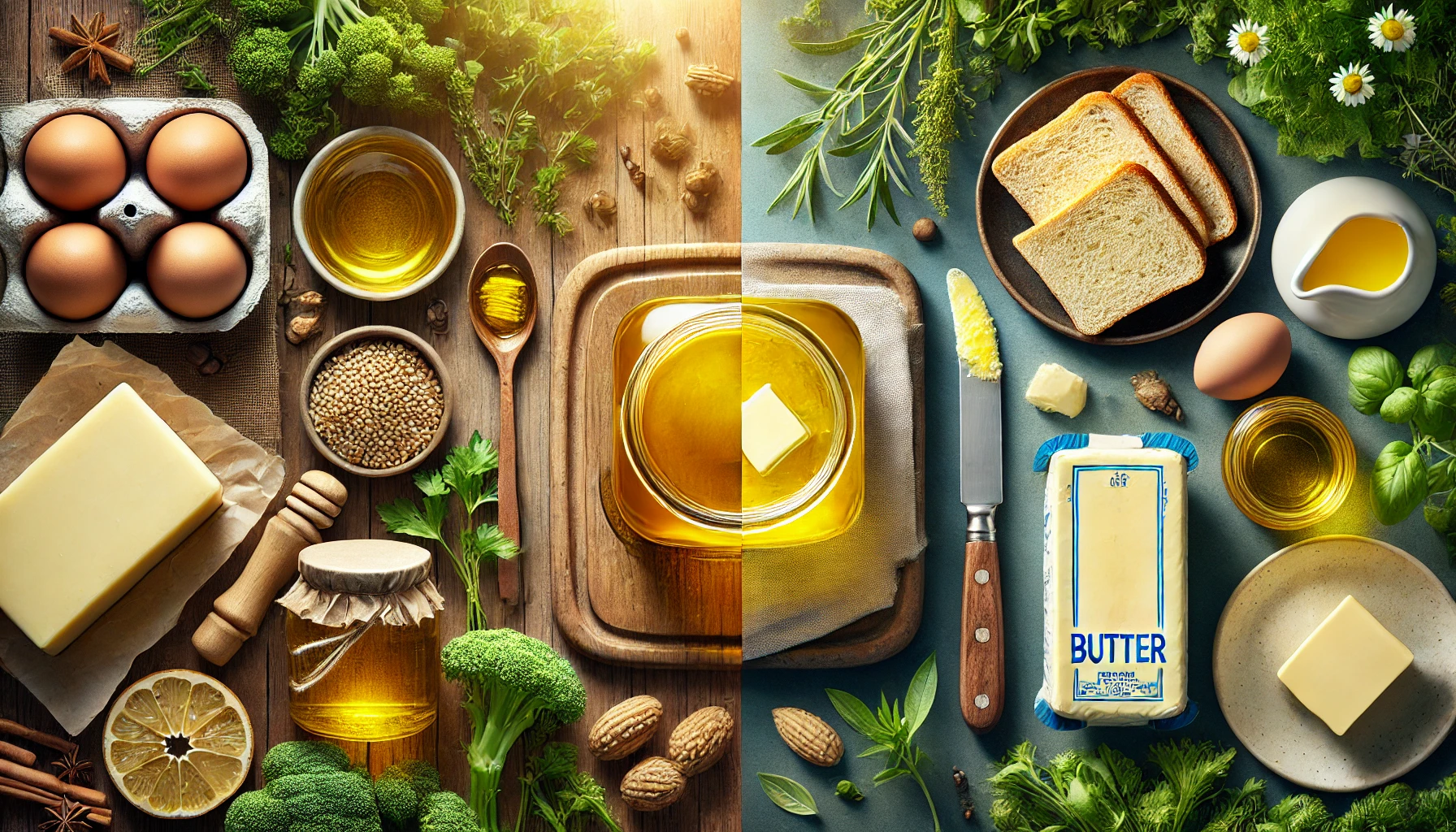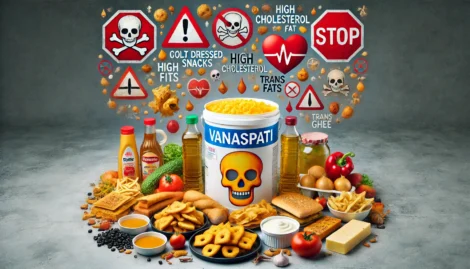- You have no items in your shopping cart
- Subtotal: ₹0.00

The Ghee vs Butter Debate: Which One Is Better for You?
Butter and ghee are staples in kitchens worldwide, revered for their flavor and versatility in cooking. Both are forms of clarified fat derived from milk, but the debate surrounding which is healthier or more suitable for certain diets has persisted for decades. While butter has been a kitchen favorite for centuries in the West, ghee has held a similar position in India and parts of Asia due to its long shelf life and medicinal properties.
In recent years, ghee has gained popularity in Western countries, where it has been praised for its unique health benefits and culinary versatility. Yet, many people are left wondering: Is ghee really better than butter? Let’s dive into the differences between ghee and butter, exploring their nutritional profiles, health benefits, and culinary uses to determine which one holds the edge in this age-old debate.
What Are Ghee and Butter?
Before we begin the comparison, it’s important to understand what ghee and butter are, and how they are made.
What is Ghee?
Ghee is a form of clarified butter that has been cooked to remove water and milk solids, leaving behind pure butterfat. The process of making ghee involves simmering butter until the water evaporates and the milk proteins, such as casein and lactose, separate. These solids are then skimmed off, leaving behind a golden liquid fat that has a nutty aroma and rich flavor.
Ghee has been used in Indian cooking and Ayurvedic medicine for thousands of years, praised for its healing properties and long shelf life. Unlike butter, which needs to be refrigerated, ghee can be stored at room temperature for long periods without going rancid.
What is Butter?
Butter is a dairy product made by churning cream or milk to separate the fat from the buttermilk. Unlike ghee, butter retains its water content and milk solids, giving it a creamy texture and rich flavor. Butter is commonly used in baking, sautéing, and as a spread, and it’s a key ingredient in many Western cuisines.
While butter is a rich source of fat, it contains milk solids that can burn easily at high temperatures, making it less suitable for high-heat cooking compared to ghee.
Nutritional Comparison: Ghee vs. Butter
The key to determining whether ghee or butter is healthier lies in their nutritional composition. While both are sources of fat, there are some important differences that may make one better suited to your diet than the other.
1. Fat Content
- Ghee: Ghee is composed almost entirely of fat, with no carbohydrates or protein. Since the water and milk solids have been removed, ghee is made up of around 99.5% fat.
- Butter: Butter contains around 80% fat, with the remaining 20% consisting of water and milk solids. Butter also contains trace amounts of carbohydrates and protein due to the presence of lactose and casein.
In terms of fat content, ghee is more concentrated than butter, but this doesn’t necessarily make it less healthy. It’s important to note that the type of fat matters just as much as the amount.
2. Saturated Fats
Both ghee and butter are rich in saturated fats, which have been the subject of controversy due to their association with heart disease. However, recent research has challenged the long-held belief that all saturated fats are harmful. In fact, saturated fats play a vital role in hormone production, cell membrane integrity, and energy storage.
- Ghee: Ghee is composed of about 62% saturated fats. These fats are stable at high temperatures and less likely to oxidize, making ghee a better option for cooking at high heat. The saturated fats in ghee are mainly medium-chain triglycerides (MCTs), which are easier for the body to digest and convert into energy.
- Butter: Butter is also high in saturated fats, making up around 51% of its fat content. However, butter contains more short-chain fatty acids, such as butyrate, which have been shown to have anti-inflammatory effects and promote gut health.
While both ghee and butter contain saturated fats, ghee’s composition of MCTs may give it an edge when it comes to digestion and energy metabolism.
3. Cholesterol Content
Cholesterol is another point of contention in the ghee vs. butter debate. Both ghee and butter contain cholesterol, but recent research suggests that dietary cholesterol doesn’t have as much of an impact on blood cholesterol levels as previously thought.
- Ghee: Ghee contains slightly more cholesterol than butter, with around 33 mg of cholesterol per tablespoon.
- Butter: Butter contains about 31 mg of cholesterol per tablespoon.
While the difference in cholesterol content is minimal, it’s worth noting that moderation is key when consuming either ghee or butter, especially if you have concerns about heart health.
4. Lactose and Casein Content
One of the biggest differences between ghee and butter is their lactose and casein content, which is important for individuals who are lactose intolerant or have dairy allergies.
- Ghee: Ghee is virtually free of lactose and casein since these milk solids are removed during the clarification process. This makes ghee a great option for people with lactose intolerance or dairy sensitivities.
- Butter: Butter contains small amounts of lactose and casein, which may cause digestive issues for those who are lactose intolerant or allergic to dairy.
For individuals with dairy sensitivities, ghee is the clear winner as it eliminates the potential for allergic reactions or digestive discomfort.
5. Vitamins and Antioxidants
Both ghee and butter are rich in fat-soluble vitamins, which are essential for overall health.
- Ghee: Ghee is a rich source of vitamins A, E, and K2. Vitamin A is crucial for maintaining healthy vision and skin, while vitamin E acts as an antioxidant that protects cells from oxidative damage. Vitamin K2 is important for bone health and helps direct calcium to where it’s needed in the body.
- Butter: Like ghee, butter is also rich in vitamins A, E, and K2. However, because ghee is more concentrated, it contains higher levels of these vitamins compared to butter.
Both ghee and butter provide essential vitamins and antioxidants, but ghee’s concentration of these nutrients makes it the more nutrient-dense option.
Health Benefits: Ghee vs. Butter
Now that we’ve compared the nutritional profiles of ghee and butter, let’s explore their health benefits. Both ghee and butter offer unique benefits, but ghee may have an advantage in several key areas.
1. Better for Digestion
Ghee has long been used in Ayurvedic medicine for its digestive benefits. The MCTs in ghee are easily absorbed by the body and provide a quick source of energy. Additionally, ghee stimulates the secretion of gastric juices, which aids in digestion and the absorption of nutrients.
Butter, on the other hand, contains lactose and casein, which can be difficult to digest for individuals with dairy sensitivities. Ghee’s lack of lactose and casein makes it a better option for those with digestive issues.
2. Anti-Inflammatory Properties
Ghee contains butyrate, a short-chain fatty acid that has been shown to reduce inflammation in the body. Butyrate is known to support gut health by maintaining the integrity of the intestinal lining and reducing the risk of leaky gut syndrome.
While butter also contains butyrate, the higher concentration of this beneficial fatty acid in ghee makes it a more potent anti-inflammatory food.
3. Higher Smoke Point
One of the main reasons ghee is favored in cooking, particularly in Indian cuisine, is its high smoke point. Ghee has a smoke point of around 485°F (252°C), which makes it ideal for frying, sautéing, and deep-frying without the risk of burning or producing harmful free radicals.
Butter, on the other hand, has a lower smoke point of around 350°F (177°C) due to its water and milk solids content. This makes butter less suitable for high-heat cooking, as it can burn easily and release harmful compounds.
4. Shelf Stability
Because ghee is free of water and milk solids, it has a long shelf life and can be stored at room temperature for months without spoiling. In contrast, butter requires refrigeration to prevent it from going rancid.
Ghee’s shelf stability makes it a convenient option for those who want a cooking fat that doesn’t require refrigeration and can be stored for long periods.
5. Keto and Paleo-Friendly
Ghee is a popular choice for those following ketogenic and paleo diets, which emphasize healthy fats and limit carbohydrates. Ghee’s high concentration of healthy fats, particularly MCTs, makes it an excellent source of fuel for individuals on low-carb diets.
While butter is also keto and paleo-friendly, its lower fat content and the presence of lactose and casein make ghee a more suitable option for those with dietary restrictions.
Culinary Uses: Ghee vs. Butter
When it comes to cooking, both ghee and butter offer unique flavors and textures that can enhance your dishes. However, ghee’s versatility and higher smoke point make it a more practical choice for certain cooking methods.
1. Frying and Sautéing
Ghee’s high smoke point makes it ideal for frying and sautéing. It can withstand high temperatures without burning or breaking down, making it perfect for dishes that require prolonged cooking at high heat, such as stir-fries, fried foods, and seared meats.
Butter, with its lower smoke point, is better suited for low-heat cooking methods like sautéing vegetables or making sauces. While butter adds a rich flavor to dishes, it’s more likely to burn if used at high temperatures.
2. Baking
Both ghee and butter can be used in baking, but they offer slightly different results. Ghee’s lack of water content makes it a more concentrated fat, which can result in denser baked goods. However, ghee imparts a rich, nutty flavor that can elevate the taste of your baked goods.
Butter, with its creamy texture and higher water content, is a classic choice for baking. It creates light, fluffy textures in cakes, cookies, and pastries. If you prefer a more delicate texture in your baked goods, butter may be the better option.
3. Spreading and Topping
Butter is a popular choice as a spread for toast, pancakes, and waffles due to its creamy texture and rich flavor. Ghee, while spreadable, has a slightly grainy texture that may not be as appealing for spreading.
However, ghee can be drizzled over dishes like rice, vegetables, and meats to add a rich, buttery flavor without the risk of burning. Ghee’s nutty taste pairs well with a wide variety of savory and sweet dishes.
Conclusion: Is Ghee Really Better Than Butter?
When it comes to the ghee vs. butter debate, there is no definitive answer that applies to everyone. Both ghee and butter offer unique health benefits and culinary uses, and the choice ultimately comes down to personal preference and dietary needs.
Why Choose Ghee?
- Ghee is better for high-heat cooking due to its higher smoke point.
- It is lactose and casein-free, making it suitable for individuals with dairy sensitivities.
- Ghee has a longer shelf life and doesn’t require refrigeration.
- It contains higher concentrations of certain vitamins and antioxidants.
Why Choose Butter?
- Butter has a creamy texture that’s ideal for spreading and baking.
- It contains beneficial short-chain fatty acids like butyrate, which support gut health.
- Butter is readily available and more affordable than ghee.
Ultimately, both ghee and butter can be part of a healthy diet when consumed in moderation. If you’re looking for a cooking fat that can withstand high heat and offers additional health benefits, ghee may be the better option for you. However, if you prefer a more traditional, creamy fat for baking and spreading, butter is still a great choice.



